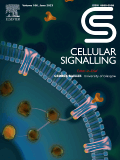The Aplastic Anemia and MDS International Foundation (AAMDSIF) has awarded Isabel Merida's study on the role of diacylglycerol kinase zeta in early stages of aplastic anemia with a two-year grant.
AAMDSIF is the world's leading nonprofit health organization dedicated to patients afflicted with bone marrow failure disease. For nearly 30 years, AAMDSIF has provided research grants totaling in excess of $4 million to an international group of more than 75 researchers to help advance the understanding and treatment of aplastic anemia, myelodysplastic syndromes (MDS), and paroxysmal nocturnal hemoglobinuria (PNH).
The Álvaro Entrecanales Foundation and the Jerôme Lejeune Foundation have awarded Cristina Rodríguez from the Isabel Mérida group at the CNB the predoctoral fellowship in basic and clinical research in Down Syndrome, Trisonomy 21.
Cell Signal. 2014;. pii: S0898-6568(14)00227-7.
Bartolomé RA, Díaz-Martínez M, Coló GP, Arellano-Sánchez N, Torres-Ayuso P, Kleinovink JW, Mérida I, Teixidó J.
 Activation of the GTPase RhoA linked to cell invasion can be tightly regulated following Gα13 stimulation. We have used a cellular model displaying Gα13-dependent inhibition of RhoA activation associated with defective cell invasion to the chemokine CXCL12 to characterize the molecular players regulating these processes.
Activation of the GTPase RhoA linked to cell invasion can be tightly regulated following Gα13 stimulation. We have used a cellular model displaying Gα13-dependent inhibition of RhoA activation associated with defective cell invasion to the chemokine CXCL12 to characterize the molecular players regulating these processes.
Using both RNAi transfection approaches and protein overexpression experiments here we show that the Src kinase Blk is involved in Gα13-activated tyrosine phosphorylation of p190RhoGAP, which causes RhoA inactivation and ultimately leads to deficient cell invasion. Characterization of molecular interplays between Gα13, Blk and p190RhoGAP revealed that Blk binds Gα13, and that Blk-mediated p190RhoGAP phosphorylation upon Gα13 activation correlates with weakening of Gα13-Blk association connected to increased Blk-p190RhoGAP assembly.
These results place Blk upstream of the p190RhoGAP-RhoA pathway in Gα13-activated cells, overall representing an opposing signaling module during CXCL12-triggered invasion. In addition, analyses with Blk- or Gα13-knockdown cells indicated that Blk can also mediate CXCL12-triggered phosphorylation of p190RhoGAP independently of Gα13. However, even if CXCL12 induces the Blk-mediated GAP phosphorylation, the simultaneous stimulation of the guanine-nucleotide exchange factor Vav1 by the chemokine, as earlier reported, leads to a net increase in RhoA activation. Therefore, when Gα13 is concurrently stimulated with CXCL12 there appears to be sufficient Blk activity to promote adequate levels of p190RhoGAP tyrosine phosphorylation to inactivate RhoA and to impair cell invasiveness.
COOKIES POLICY
A cookie is a text file that is stored on your computer or mobile device via a web server and only that server will be able to retrieve or read the contents of the cookie and allow the Web site remember browser preferences and navigate efficiently. Cookies make the interaction between the user and the website faster and easier.
General information
This Website uses cookies. Cookies are small text files generated by the web pages you visit, which contain the session data that can be useful later in the website. In this way this Web remembers information about your visit, which can facilitate your next visit and make the website more useful.
How do cookies?
Cookies can only store text, usually always anonymous and encrypted. No personal information is ever stored in a cookie, or can be associated with identified or identifiable person.
The data allow this website to keep your information between the pages, and also to discuss how to interact with the website. Cookies are safe because they can only store information that is put there by the browser, which is information the user entered in the browser or included in the page request. You can not run the code and can not be used to access your computer. If a website encrypts cookie data, only the website can read the information.
What types of cookies used?
The cookies used by this website can be distinguished by the following criteria:
1. Types of cookies as the entity that manages:
Depending on who the entity operating the computer or domain where cookies are sent and treat the data obtained, we can distinguish:
- Own cookies: are those that are sent to the user's terminal equipment from a computer or domain managed by the editor itself and from which provides the service requested by the user.
- Third party cookies: these are those that are sent to the user's terminal equipment from a machine or domain that is not managed by the publisher, but by another entity data is obtained through cookies.
In the event that the cookies are installed from a computer or domain managed by the editor itself but the information collected by these is managed by a third party can not be considered as party cookies.
2. Types of cookies as the length of time that remain active:
Depending on the length of time that remain active in the terminal equipment can be distinguished:
- Session cookies: cookies are a type designed to collect and store data while the user accesses a web page. Are usually used to store information that only worth preserving for the service requested by the user at any one time (eg a list of products purchased).
- Persistent cookies: cookies are a type of data which are stored in the terminal and can be accessed and treated for a period defined by the head of the cookie, and can range from a few minutes to several years.
3. Cookies types according to their purpose:
Depending on the purpose for which the data are processed through cookies, we can distinguish between:
- Technical cookies: these are those that allow the user to navigate through a web page or application platform and the use of different options or services it exist as, for example, control traffic and data communication, identify the session, access to restricted access parts, remember the elements of an order, make the buying process an order, make an application for registration or participation in an event, use security features while browsing store content for dissemination videos or sound or share content via social networks.
- Customization cookies: these are those that allow the user to access the service with some general characteristics based on a predefined set of criteria in the user terminal would eg language, the type of browser through which you access the service, the locale from which you access the service, etc.
- Analysis cookies: they are those that allow the responsible for them, monitoring and analyzing the behavior of users of the web sites that are linked. The information gathered through such cookies are used in measuring the activity of web sites, application or platform and for the profiling of user navigation of such sites, applications and platforms, in order to make improvements function data analysis how users use the service.
Management tool cookies
This Website uses Google Analytics.
Google Analytics is a free tool from Google that primarily allows website owners know how users interact with your website. Also, enable cookies in the domain of the site in which you are and uses a set of cookies called "__utma" and "__utmz" to collect information anonymously and reporting of website trends without identifying individual users..
For statistics of use of this website use cookies in order to know the level of recurrence of our visitors and more interesting content. This way we can concentrate our efforts on improving the most visited areas and make the user more easily find what they are looking for. On this site you can use the information from your visit for statistical evaluations and calculations anonymous data and to ensure the continuity of service or to make improvements to their websites. For more details, see the link below privacy policy [http://www.google.com/intl/en/policies/privacy/]
How to manage cookies on your computer: disabling and deleting cookies
All Internet browsers allow you to limit the behavior of a cookie or disable cookies within settings or browser settings. The steps for doing so are different for each browser, you can find instructions in the help menu of your browser.
If you decline the use of cookies, since it is possible thanks to the preferences menu of your browser or settings, reject, this website will continue to function properly without the use of the same.
Can you allow, block or delete cookies installed on your computer by setting your browser options installed on your computer:
- For more information about Internet Explorer click here.
- For more information on Chrome click here.
- For more information about Safari click here.
- For more information about Firefox click here.
Through your browser, you can also view the cookies that are on your computer, and delete them as you see fit. Cookies are text files, you can open and read the contents. The data within them is almost always encrypted with a numeric key corresponding to an Internet session so often has no meaning beyond the website who wrote it.
Informed consent
The use of this website on the other hand, implies that you paid your specific consent to the use of cookies, on the terms and conditions provided in this Cookies Policy, without prejudice to the measures of deactivation and removal of cookies that you can take, and mentioned in the previous section.







